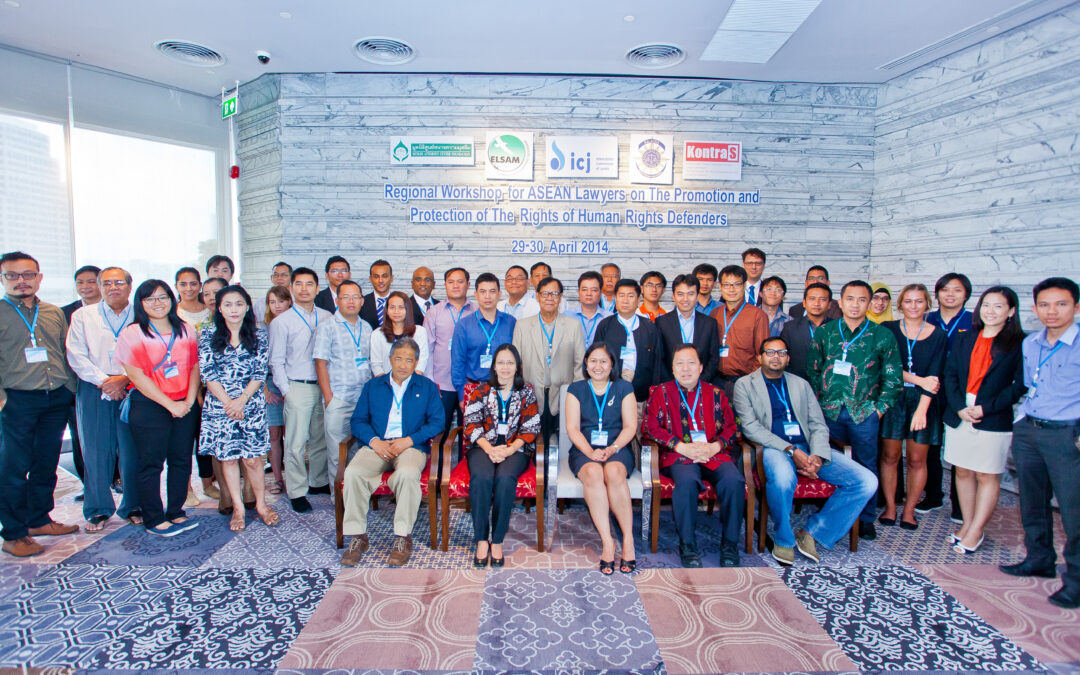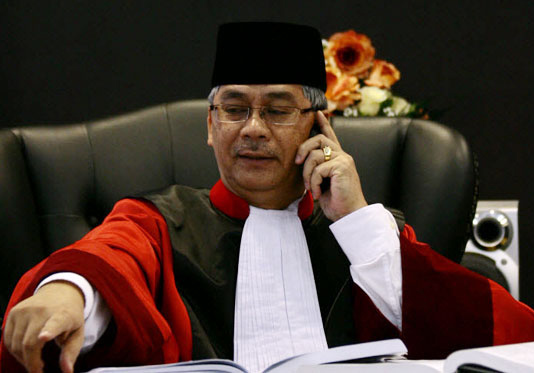
ASEAN lawyers to work towards stronger human rights safeguards
More than 40 delegates from nine countries attended a regional workshop for ASEAN lawyers in Bangkok April 28-30 on the promotion and protection of the rights of human rights defenders.
Report of the Special Rapporteur on adequate housing as a component of the right to an adequate standard of living, A/HRC/25/54/Add.1, 26 December 2013: Indonesia
VIII. Access to housing of vulnerable groups 69. During her visit, the Special Rapporteur also heard testimonies from lesbian, gay, bisexual and transgender (LGBT) individuals who have encountered discrimination in the private housing sector. She received reports of...
Indonesia: ICJ calls on authorities to ensure right to a fair trial for Chief Justice of the Constitutional Court
The ICJ is calling on the Indonesian authorities to ensure that the proceedings against Justice Akil Mochtar fully comply with international law and standards on fair trial and the independence and impartiality of the judiciary.
Justice Mochtar, Chief Justice of Indonesia’s Constitutional Court (photo), is accused of taking a bribe to issue a favourable verdict in an election dispute.
Justice Mochtar was arrested on 2 October 2013 and remains in custody. According to a spokesperson for the Corruption Eradication Commission, he is alleged to have received a bribe, through several intermediaries, from Hambit Binti, a district chief whose re-election was contested.
The Constitutional Court has sole jurisdiction over disputes contesting the conduct or results of elections.
The ICJ calls for a prompt, thorough and impartial investigation of these serious allegations.
The impartiality of the judiciary is an essential condition for respect for the rule of law, and is undermined when judicial decisions are made on the basis of financial inducements rather than solely according to evidence and the law.
Integrity is vital to the proper discharge of judicial office, and any judge must ensure that his or her conduct is above reproach, maintaining and enhancing the confidence of the public in the impartiality of both the individual judge and the judiciary as a whole.
According to the Beijing Statement of Principles on Independence of the Judiciary in the LAWASIA Region, signed by 32 judicial heads of Asia Pacific States, including the Chief Justice of Indonesia, “Judges shall uphold the integrity and independence of the judiciary by avoiding impropriety and the appearance of impropriety in all their activities.”
At the same time, the ICJ stresses that any eventual criminal or disciplinary proceedings, should those be warranted, must respect the independence of the judiciary and Justice Mochtar’s right to a fair trial.
Judges charged with a criminal offence, like all other persons, have the right to a fair trial by a competent, independent and impartial tribunal established by law.
The right to a fair trial in criminal cases as recognized in Indonesia and under international law and standards, including Article 14(3) of the International Covenant on Civil and Political Rights, comprises a series of procedural and substantive safeguards that must be respected during the pre-trial and trial phases.
Contact
Sam Zarifi, ICJ Asia-Pacific Regional Director, Bangkok, tel. no. +66 8078 19002 or sam.zarifi(a)icj.org
Laurens Hueting, ICJ Associate Legal Adviser (International Law and Protection Programme), Geneva, tel. no. +41 22 979 3848 or laurens.hueting(a)icj.org

ICJ calls on Indonesia to abolish death penalty
Indonesia’s resumption of the death penalty after a four-year moratorium is a major setback for the country’s human rights record, the ICJ said today.
Indonesia executed Adami Wilson Bin Adam on 15 March 2013. After the execution, Indonesia’s Attorney General Basrief Arief announced that the government was set to execute nine more convicts this year.
“The Indonesian government should immediately reverse its decision to proceed with more executions in defiance of global trends toward the abolition of the death penalty,” said Emerlynne Gil, ICJ’s International Legal Advisor for Southeast Asia in Bangkok. “At least 150 countries have now either abolished the death penalty or instituted an official or unofficial moratorium. There is a growing understanding around the world that the death penalty is an unacceptable assault on rights and dignity.”
Adami Wilson Bin Adam was convicted in 2004 for smuggling one kilogram of heroin into the country. In Indonesia, the law prescribes the penalty of death for trafficking narcotics.
During its Universal Periodic Review (UPR) in 2012 at the UN Human Rights Council, Indonesia rejected recommendations to abolish the death penalty or establish a moratorium on executions.
In its reply, the Government of Indonesia said that death penalty is imposed “selectively only for serious crimes.” However, the UN Special Rapporteur on extrajudicial, summary or arbitrary executions, in his report, emphasized that “the death penalty should be eliminated for crimes such as economic crimes and drug-related offences.”
Indonesia last carried out executions four years ago. In 2008 it executed three men convicted of the 2002 Bali bombings.
“This execution undermines Indonesia’s repeated efforts to position itself as a regional human rights leader,” Gil added. “Its resumption of executions is indeed a very grave setback not only for Indonesia, but also for the region and ASEAN, the Association of South East Asia Nations.”
The ICJ says that use of the death penalty violates the right to life and the right not to be subjected to cruel, inhuman, or degrading treatment or punishment.
Last November 2012, the UN General Assembly issued a resolution calling on all Member States to establish a moratorium on executions with a view to abolishing the death penalty.
The resolution was adopted by an overwhelming number of votes from Member States. Indonesia abstained from the vote.
The ICJ calls Indonesia to immediately ratify the 2nd Optional Protocol to the International Covenant on Civil and Political Rights, which obligates State Parties to take all necessary measures to abolish the death penalty.
In the immediate term, the country should implement a moratorium on the practice, the ICJ adds.




